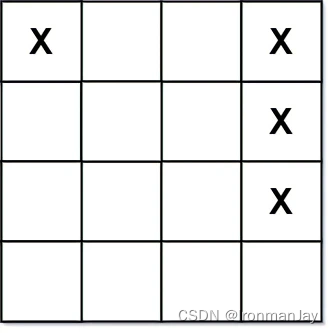【LeetCode每日一题】——419.甲板上的战舰
创始人
2024-06-02 15:57:16
0次
文章目录
- 一【题目类别】
- 二【题目难度】
- 三【题目编号】
- 四【题目描述】
- 五【题目示例】
- 六【解题思路】
- 七【题目提示】
- 八【题目进阶】
- 九【时间频度】
- 十【代码实现】
- 十一【提交结果】
一【题目类别】
- 深度优先搜索
二【题目难度】
- 中等
三【题目编号】
- 419.甲板上的战舰
四【题目描述】
- 给你一个大小为 m x n 的矩阵 board 表示甲板,其中,每个单元格可以是一艘战舰 ‘X’ 或者是一个空位 ‘.’ ,返回在甲板 board 上放置的 战舰 的数量。
- 战舰 只能水平或者垂直放置在 board 上。换句话说,战舰只能按 1 x k(1 行,k 列)或 k x 1(k 行,1 列)的形状建造,其中 k 可以是任意大小。两艘战舰之间至少有一个水平或垂直的空位分隔 (即没有相邻的战舰)。
五【题目示例】
-
示例 1:

- 输入:board = [[“X”,“.”,“.”,“X”],[“.”,“.”,“.”,“X”],[“.”,“.”,“.”,“X”]]
- 输出:2
-
示例 2:
- 输入:board = [[“.”]]
- 输出:0
六【解题思路】
- 本题可以用深度优先搜索直接解决,比较简单,但是在这里提供一种比较巧妙地解法:
- 通过分析题目我们可以发现,每个战舰之间都要么上下隔着海水,要么左右隔着海水,也就是没有相邻的战舰,并且战舰要么都是横着的,要么都是竖着的,所以每个战舰的开头的左面和上面一定是都是海水,那么我们只需要搜索每艘战舰的开头就行了:
- 如果当前位置是’X’
- 并且其左边和右边都是’.',说明这就是一艘战舰的起始位置,数量加一
- 计算得到多少战舰的开头,就能得到战舰的数量
- 最后返回结果即可
七【题目提示】
- m==board.lengthm == board.lengthm==board.length
- n==board[i].lengthn == board[i].lengthn==board[i].length
- 1<=m,n<=2001 <= m, n <= 2001<=m,n<=200
- board[i][j]是′.′或′X′board[i][j] 是 '.' 或 'X'board[i][j]是′.′或′X′
八【题目进阶】
- 你可以实现一次扫描算法,并只使用 O(1)O(1)O(1) 额外空间,并且不修改 board 的值来解决这个问题吗?
九【时间频度】
- 时间复杂度:O(m∗n)O(m*n)O(m∗n),其中m,nm,nm,n分别为传入的图的行和列
- 空间复杂度:O(1)O(1)O(1)
十【代码实现】
- Java语言版
class Solution {public int countBattleships(char[][] board) {int m = board.length;int n = board[0].length;int count = 0;for(int i = 0;ifor(int j = 0;jif((board[i][j] == 'X') && (i == 0 || board[i - 1][j] == '.') && (j == 0 || board[i][j - 1] == '.')){count++;}}}return count;}
}
- C语言版
int countBattleships(char** board, int boardSize, int* boardColSize)
{int m = boardSize;int n = boardColSize[0];int count = 0;for(int i = 0;ifor(int j = 0;jif((board[i][j] == 'X') && (i == 0 || board[i - 1][j] == '.') && (j == 0 || board[i][j - 1] == '.')){count++;}}}return count;
}
- Python语言版
class Solution:def countBattleships(self, board: List[List[str]]) -> int:m = len(board)n = len(board[0])count = 0for i in range(0,m):for j in range(0,n):if (board[i][j] == 'X') and (i == 0 or board[i - 1][j] == '.') and (j == 0 or board[i][j - 1] == '.'):count+=1return count
- C++语言版
class Solution {
public:int countBattleships(vector>& board) {int m = board.size();int n = board[0].size();int count = 0;for(int i = 0;ifor(int j = 0;jif((board[i][j] == 'X') && (i == 0 || board[i - 1][j] == '.') && (j == 0 || board[i][j - 1] == '.')){count++;}}}return count;}
};
十一【提交结果】
-
Java语言版

-
C语言版

-
Python语言版

-
C++语言版

相关内容
热门资讯
电视安卓系统哪个品牌好,哪家品...
你有没有想过,家里的电视是不是该升级换代了呢?现在市面上电视品牌琳琅满目,各种操作系统也是让人眼花缭...
安卓会员管理系统怎么用,提升服...
你有没有想过,手机里那些你爱不释手的APP,背后其实有个强大的会员管理系统在默默支持呢?没错,就是那...
安卓系统软件使用技巧,解锁软件...
你有没有发现,用安卓手机的时候,总有一些小技巧能让你玩得更溜?别小看了这些小细节,它们可是能让你的手...
安卓系统提示音替换
你知道吗?手机里那个时不时响起的提示音,有时候真的能让人心情大好,有时候又让人抓狂不已。今天,就让我...
安卓开机不了系统更新
手机突然开不了机,系统更新还卡在那里,这可真是让人头疼的问题啊!你是不是也遇到了这种情况?别急,今天...
安卓系统中微信视频,安卓系统下...
你有没有发现,现在用手机聊天,视频通话简直成了标配!尤其是咱们安卓系统的小伙伴们,微信视频功能更是用...
安卓系统是服务器,服务器端的智...
你知道吗?在科技的世界里,安卓系统可是个超级明星呢!它不仅仅是个手机操作系统,竟然还能成为服务器的得...
pc电脑安卓系统下载软件,轻松...
你有没有想过,你的PC电脑上安装了安卓系统,是不是瞬间觉得世界都大不一样了呢?没错,就是那种“一机在...
电影院购票系统安卓,便捷观影新...
你有没有想过,在繁忙的生活中,一部好电影就像是一剂强心针,能瞬间让你放松心情?而我今天要和你分享的,...
安卓系统可以写程序?
你有没有想过,安卓系统竟然也能写程序呢?没错,你没听错!这个我们日常使用的智能手机操作系统,竟然有着...
安卓系统架构书籍推荐,权威书籍...
你有没有想过,想要深入了解安卓系统架构,却不知道从何下手?别急,今天我就要给你推荐几本超级实用的书籍...
安卓系统看到的炸弹,技术解析与...
安卓系统看到的炸弹——揭秘手机中的隐形威胁在数字化时代,智能手机已经成为我们生活中不可或缺的一部分。...
鸿蒙系统有安卓文件,畅享多平台...
你知道吗?最近在科技圈里,有个大新闻可是闹得沸沸扬扬的,那就是鸿蒙系统竟然有了安卓文件!是不是觉得有...
宝马安卓车机系统切换,驾驭未来...
你有没有发现,现在的汽车越来越智能了?尤其是那些豪华品牌,比如宝马,它们的内饰里那个大屏幕,简直就像...
p30退回安卓系统
你有没有听说最近P30的用户们都在忙活一件大事?没错,就是他们的手机要退回安卓系统啦!这可不是一个简...
oppoa57安卓原生系统,原...
你有没有发现,最近OPPO A57这款手机在安卓原生系统上的表现真是让人眼前一亮呢?今天,就让我带你...
安卓系统输入法联想,安卓系统输...
你有没有发现,手机上的输入法真的是个神奇的小助手呢?尤其是安卓系统的输入法,简直就是智能生活的点睛之...
怎么进入安卓刷机系统,安卓刷机...
亲爱的手机控们,你是否曾对安卓手机的刷机系统充满好奇?想要解锁手机潜能,体验全新的系统魅力?别急,今...
安卓系统程序有病毒
你知道吗?在这个数字化时代,手机已经成了我们生活中不可或缺的好伙伴。但是,你知道吗?即使是安卓系统,...
奥迪中控安卓系统下载,畅享智能...
你有没有发现,现在汽车的中控系统越来越智能了?尤其是奥迪这种豪华品牌,他们的中控系统简直就是科技与艺...
